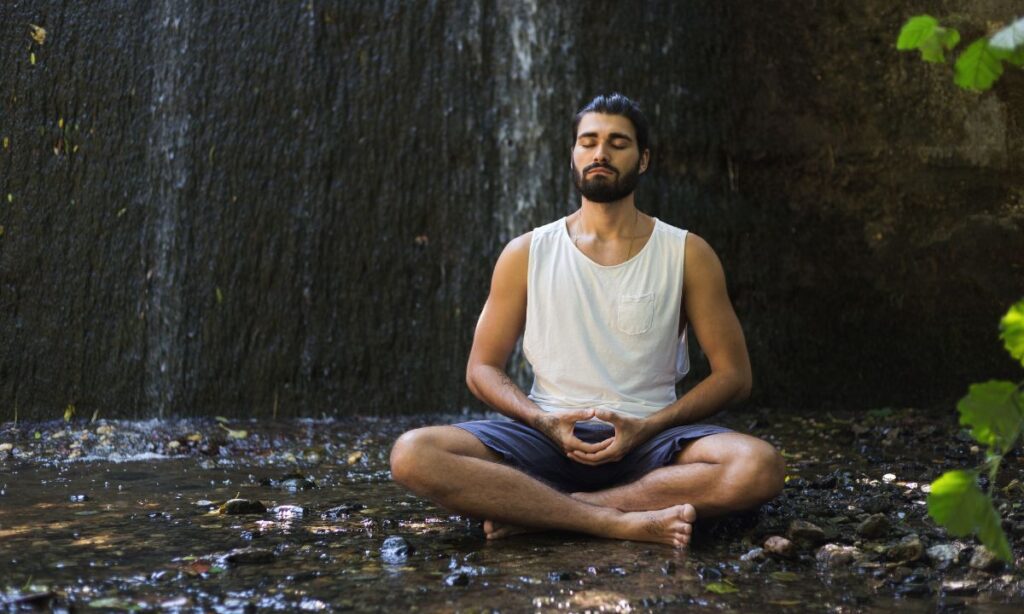Date
- 05.07.23
Are you having trouble meditating? Discover the underlying reasons behind your struggles and learn how to overcome them with this insightful guide.
Meditation can be a powerful tool for relaxation and self-reflection, but it’s not always easy to achieve a state of calm and focus. If you find yourself struggling to meditate, there may be underlying reasons that are hindering your progress. In this guide, we will explore some common obstacles to successful meditation and provide tips and techniques to help you overcome them.
Identify distractions and create a peaceful environment.
One of the main reasons people struggle with meditation is because of distractions in their environment. It’s important to create a peaceful and quiet space where you can fully focus on your practice. Identify any potential distractions, such as noise from outside, electronic devices, or clutter in your surroundings, and take steps to eliminate or minimize them. This could involve finding a quiet room in your home, using earplugs or noise-cancelling headphones, or decluttering your meditation area. Creating a peaceful environment will help you to better concentrate and achieve a deeper state of meditation.
Set realistic expectations and be patient with yourself.
It’s important to remember that meditation is a practice, and like any skill, it takes time and patience to develop. Many people struggle with meditation because they have unrealistic expectations or put too much pressure on themselves to achieve a certain outcome. It’s important to approach meditation with an open mind and a willingness to learn and grow. Understand that there will be days when your mind feels busy or restless, and that’s okay. Be patient with yourself and trust in the process. With consistent practice and a gentle attitude towards yourself, you will gradually overcome your struggles and experience the benefits of meditation.
Understand and address any physical discomfort or pain.
Physical discomfort or pain can be a major obstacle to successful meditation. It’s important to address any physical issues that may be causing discomfort during your practice. This could include finding a comfortable sitting position, using cushions or props to support your body, or adjusting your posture to alleviate any strain or tension.
If you have any chronic pain or physical conditions, it may be helpful to consult with a healthcare professional or a qualified meditation teacher who can provide guidance on how to adapt your practice to accommodate your needs. By addressing and alleviating physical discomfort, you can create a more conducive environment for meditation and enhance your overall experience.
Recognize and manage mental and emotional barriers.
In addition to physical barriers, mental and emotional barriers can also hinder your meditation practice. These barriers can include racing thoughts, anxiety, stress, or difficulty focusing. It’s important to recognize and acknowledge these barriers so that you can effectively manage them. One technique is to practice mindfulness, which involves observing your thoughts and emotions without judgment.
By becoming aware of these mental and emotional patterns, you can learn to let go of them and bring your attention back to the present moment. Additionally, incorporating relaxation techniques such as deep breathing or visualization can help calm the mind and create a more peaceful state for meditation. Remember, meditation is a practice, and it’s normal to encounter challenges along the way. By recognizing and managing these mental and emotional barriers, you can cultivate a more fulfilling and successful meditation practice.
Seek guidance and support from experienced meditators or professionals.
If you’re struggling with your meditation practice, seeking guidance and support from experienced meditators or professionals can be incredibly helpful. They can provide valuable insights, techniques, and advice to help you overcome any obstacles you may be facing. Joining a meditation group or attending meditation retreats can also provide a supportive community and a space for learning and growth. Additionally, working with a meditation teacher or therapist who specializes in mindfulness can offer personalized guidance tailored to your specific needs and challenges. Remember, you don’t have to navigate your meditation struggles alone. Seeking guidance and support can make a significant difference in your practice and help you cultivate a deeper sense of peace and well-being.




